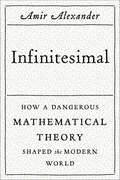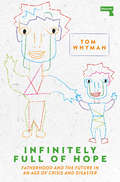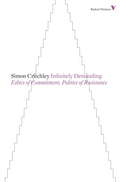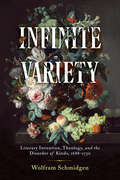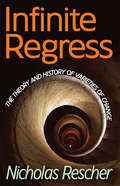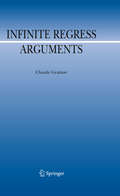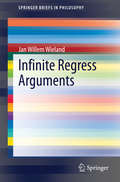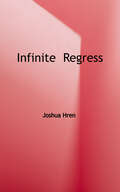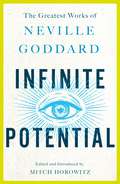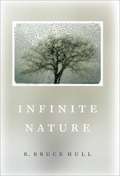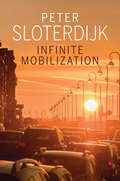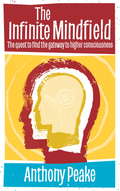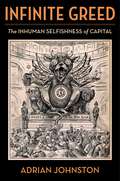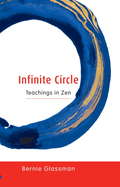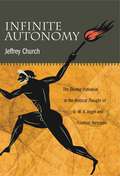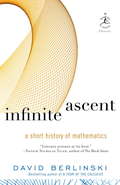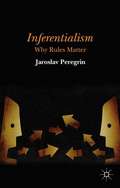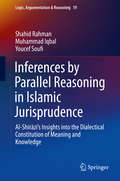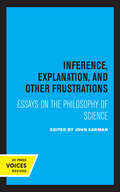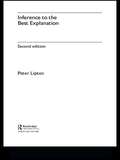- Table View
- List View
Infinitesimal: How a Dangerous Mathematical Theory Shaped the Modern World
by Amir AlexanderPulsing with drama and excitement, Infinitesimal celebrates the spirit of discovery, innovation, and intellectual achievement-and it will forever change the way you look at a simple line.On August 10, 1632, five men in flowing black robes convened in a somber Roman palazzo to pass judgment on a deceptively simple proposition: that a continuous line is composed of distinct and infinitely tiny parts. With the stroke of a pen the Jesuit fathers banned the doctrine of infinitesimals, announcing that it could never be taught or even mentioned. The concept was deemed dangerous and subversive, a threat to the belief that the world was an orderly place, governed by a strict and unchanging set of rules. If infinitesimals were ever accepted, the Jesuits feared, the entire world would be plunged into chaos.In Infinitesimal, the award-winning historian Amir Alexander exposes the deep-seated reasons behind the rulings of the Jesuits and shows how the doctrine persisted, becoming the foundation of calculus and much of modern mathematics and technology. Indeed, not everyone agreed with the Jesuits. Philosophers, scientists, and mathematicians across Europe embraced infinitesimals as the key to scientific progress, freedom of thought, and a more tolerant society. As Alexander reveals, it wasn't long before the two camps set off on a war that pitted Europe's forces of hierarchy and order against those of pluralism and change.The story takes us from the bloody battlefields of Europe's religious wars and the English Civil War and into the lives of the greatest mathematicians and philosophers of the day, including Galileo and Isaac Newton, Cardinal Bellarmine and Thomas Hobbes, and Christopher Clavius and John Wallis. In Italy, the defeat of the infinitely small signaled an end to that land's reign as the cultural heart of Europe, and in England, the triumph of infinitesimals helped launch the island nation on a course that would make it the world's first modern state.From the imperial cities of Germany to the green hills of Surrey, from the papal palace in Rome to the halls of the Royal Society of London, Alexander demonstrates how a disagreement over a mathematical concept became a contest over the heavens and the earth. The legitimacy of popes and kings, as well as our beliefs in human liberty and progressive science, were at stake-the soul of the modern world hinged on the infinitesimal.
Infinitely Full of Hope: Fatherhood and the Future in an Age of Crisis and Disaster
by Tom WhymanA philosophical memoir about becoming a father in an increasingly terrible world – can I hope the child growing in my partner's womb will have a good-enough life?A philosophical memoir about becoming a father in an increasingly terrible world. Can I hope the child growing in my partner&’s womb will have a good-enough life? For Kant, philosophy boiled down to three key questions: &“What can I know?&”, &“What ought I do?&”, and &“What can I hope for?&” In philosophy departments, that third question has largely been neglected at the expense of the first two – even though it is crucial for understanding why anyone might ask them in the first place. In Infinitely Full of Hope, as he prepares to become a father for the first time, the philosopher Tom Whyman attempts to answer Kant&’s third question, trying to make sense of it in the context of a world that increasingly seems like it is on the verge of collapse. Part memoir, part theory, and part reflection on fatherhood, Infinitely Full of Hope asks how we can cling to hope in a world marked by crisis and disaster.
Infinitely Demanding
by Simon CritchleyThe clearest, boldest and most systematic statement of Simon Critchley's influential views on philosophy, ethics, and politics, Infinitely Demanding identifies a massive political disappointment at the heart of liberal democracy. Arguing that what is called for is an ethics of commitment that can inform a radical politics, Critchley considers the possibility of political subjectivity and action after Marx and Marxism, taking in the work of Kant, Levinas, Badiou and Lacan. Infinitely Demanding culminates in an argument for anarchism as an ethical practice and a remotivating means of political organization.From the Trade Paperback edition.
Infinite Variety: Literary Invention, Theology, and the Disorder of Kinds, 1688-1730
by Wolfram SchmidgenUnnerved by the upheavals of the seventeenth century, English writers including Thomas Hobbes, Richard Blackmore, John Locke, Jonathan Swift, and Daniel Defoe came to accept that disorder, rather than order, was the natural state of things. They were drawn to voluntarism, a theology that emphasized a willful creator and denied that nature embodied truth and beauty. Voluntarism, Wolfram Schmidgen contends, provided both theological framework and aesthetic license. In Infinite Variety, he reconstructs this voluntarist tradition of literary invention.Once one accepted that creation was willful and order arbitrary, Schmidgen argues, existing hierarchies of kind lost their normative value. Literary invention could be radicalized as a result. Acknowledging that the will drives creation, such writers as Blackmore and Locke inverted the rules of composition and let energy dominate structure, matter create form, and parts be valued over the whole. In literary, religious, and philosophical works, voluntarism authorized the move beyond the natural toward the deformed, the infinite, and the counterfactual.In reclaiming ontology as an explanatory context for literary invention, Infinite Variety offers a brilliantly learned analysis of an aesthetic framed not by the rise of secularism, but by its opposite. It is a book that articulates how religious belief shaped modern literary practices, including novelistic realism, and one that will be of interest to anyone who thinks seriously about the relationship between literature, religion, and philosophy.
Infinite Resignation: On Pessimism
by Eugene ThackerA collection of aphorisms, fragments, and observations on philosophy and pessimism.Composed of aphorisms, fragments, and observations both philosophical and personal, Eugene Thacker’s Infinite Resignation traces the contours of pessimism, caught as it is between a philosophical position and a bad attitude. By turns melancholic, misanthropic, and tinged with gallows humor, Thacker’s writing tenuously hovers over that point at which the thought of futility becomes the futility of thought.
Infinite Regress: The Theory and History of Varieties of Change
by Nicholas RescherRegression addresses what has come before; it is a matter of looking backward of retrospections? The motionless things of nature are generally forward-looking their problem is that of the question: Where do we go from here? It is primarily with intelligent beings that we ask: How did we get to where we now find ourselves? Regression and infinite regression in particular is thus a concept that has gained a greater prominence in the human sciences than in the sciences of nature. Argumentation to infinite regress has long been a favored instrument of philosophical dialectic. Philosophers have used it to disprove the positions they model to criticize. Infinite regresses, so they reason, are unrealizable: they cannot be completed so as to achieve some definitive result. And thereby anything that would engender an infinite regress is automatically made ineffective. Infinite Regress examines the theory of regression and includes information on the topics of vicious regress, innocuous regress, circularity regress, and propositional regress. Also discussed is the history of regression stemming from ancient times, to medieval times, to early modern history. Some of the other chapters in this book focus on world class philosophers including Immanuel Kant, Georg Wilhelm Friedrich Hegel, and Bertrand Russell. The book will play a significant role in theoretical philosophy as well as in social philosophy and the philosophy of mind.
Infinite Regress Arguments
by Claude GrattonInfinite regress arguments are part of a philosopher's tool kit of argumentation. But how sharp or strong is this tool? How effectively is it used? The typical presentation of infinite regress arguments throughout history is so succinct and has so many gaps that it is often unclear how an infinite regress is derived, and why an infinite regress is logically problematic, and as a result, it is often difficult to evaluate infinite regress arguments. These consequences of our customary way of using this tool indicate that there is a need for a theory to re-orient our practice. My general approach to contribute to such a theory, consists of collecting and evaluating as many infinite regress arguments as possible, comparing and contrasting many of the formal and non-formal properties, looking for recurring patterns, and identifying the properties that appeared essential to those patterns. Two very general questions guided this work: (1) How are infinite regresses generated in infinite regress arguments? (2) How do infinite regresses logically function as premises in an argument? In answering these questions I clarify the notion of an infinite regress; identify different logical forms of infinite regresses; describe different kinds of infinite regress arguments; distinguish the rhetoric from the logic in infinite regress arguments; and suggest ways of improving our discussion and our practice of constructing and evaluating these arguments.
Infinite Regress Arguments
by Jan Willem WielandThis book on infinite regress arguments provides (i) an up-to-date overview of the literature on the topic, (ii) ready-to-use insights for all domains of philosophy, and (iii) two case studies to illustrate these insights in some detail. Infinite regress arguments play an important role in all domains of philosophy. There are infinite regresses of reasons, obligations, rules, and disputes, and all are supposed to have their own moral. Yet most of them are involved in controversy. Hence the question is: what exactly is an infinite regress argument, and when is such an argument a good one?
Infinite Regress
by Joshua HrenIn the years since his graduation from St. Marquis University, Blake Yourrick has fled his family and Milwaukee, rotating from job to dead-end job-working the Bakken oilfields in Dakota and even signing on as the night caretaker of a rural abbey graveyard. Deep in student debt and estranged from his misanthropic, alcoholic father, Blake is haunted by the memory of his mother's death-and by his relationship with his college mentor, a defrocked priest named Theo Hape, who is known for his adventurous theological ideas as well as for the uncanny , seductive power he wields over his students. When Hape, learning of his former charge's desperate straits, proposes a perverse exchange of services, Blake finds himself tempted to test the professor's radical theories in real life. What follows is a metaphysical duel reminiscent of the novels of Dostoevsky and Bernanos, pitting a modern-day anti-Christ against a reckless but resilient young man and his well-meaning, dysfunctional kin.
Infinite Potential: The Greatest Works of Neville Goddard
by Neville GoddardA spiritually transformative collection of Neville Goddard’s works—including never-before-published material Neville Goddard, most often known simply as Neville, is one of the most powerful writers in the realm of mystical spirituality. Unknown during his lifetime, his work has grown increasingly popular, and his writings have influenced the likes of Rhonda Byrne, Carlos Castaneda, Joseph Murphy, and Wayne Dyer. The founding principle of Neville’s work was stunning in its simplicity—Your imagination is God. This message of empowerment has resonated with countless readers, urging them to fearlessly explore their own potential in a new way. Compiled and introduced by PEN Award-winning historian Mitch Horowitz, Infinite Potential is a curated compendium of Neville’s work, including the complete text of his first book, At Your Command, along with rare pamphlets, transcriptions and three never-before anthologized pieces from the great writer. Horowitz is the leading expert on Neville and his teachings, and his introduction frames Neville’s work in both a historical and modern-day context, offering a complete timeline of the writer’s somewhat mysterious life. Infinite Potential is an accessible and profound anthology from one of the greatest spiritual minds of the 20th century.
Infinite Nature
by R. Bruce HullYou would be hard-pressed to find someone who categorically opposes protecting the environment, yet most people would agree that the environmentalist movement has been ineffectual and even misguided. Some argue that its agenda is misplaced, oppressive, and misanthropic—a precursor to intrusive government, regulatory bungles, and economic stagnation. Others point out that its alarmist rhetoric and preservationist solutions are outdated and insufficient to the task of galvanizing support for true reform. In this impassioned and judicious work, R. Bruce Hull argues that environmentalism will never achieve its goals unless it sheds its fundamentalist logic. The movement is too bound up in polarizing ideologies that pit humans against nature, conservation against development, and government regulation against economic growth. Only when we acknowledge the infinite perspectives on how people should relate to nature will we forge solutions that are respectful to both humanity and the environment. Infinite Nature explores some of these myriad perspectives, from the scientific understandings proffered by anthropology, evolution, and ecology, to the promise of environmental responsibility offered by technology and economics, to the designs of nature envisioned in philosophy, law, and religion. Along the way, Hull maintains that the idea of nature is social: in order to reach the common ground where sustainable and thriving communities are possible, we must accept that many natures can and do exist. Incisive, heartfelt, and brimming with practical solutions, Infinite Nature brings a much-needed and refreshing voice to the table of environmental reform.
Infinite Mobilization
by Peter SloterdijkThe core of what we refer to as ‘the project of modernity’ is the idea that human beings have the power to bring the world under their control, and hence it is based on a ‘kinetic utopia’: the movement of the world as a whole reflects the implementation of our plans for it. But as soon as the kinetic utopia of modernity is exposed, its seemingly stable foundation cracks open and new problems appear: things don’t happen according to plan because as we actualize our plans, we set in motion other things that we didn’t want as unintended side-effects. We watch with mounting unease as the self-perpetuating side-effects of modern progress overshadow our plans, as a foreign movement breaks off from the very core of the modern project supposedly guided by reason and slips away from us, spinning out of control. What looked like a steady march towards freedom turns out to be a slide into an uncontrollable and catastrophic syndrome of perpetual mobilization. And precisely because so much comes about through our actions, these developments turn out to have explosive consequences for our self-understanding, as we begin to realize that, so far from bringing the world under our control, we are instead the agents of our own destruction.In this brilliant and insightful book Sloterdijk lays out the elements of a new critical theory of modernity understood as a critique of political kinetics, shifting the focus of critical theory from production to mobilization and shedding new light on a world facing the growing risk of humanly induced catastrophe.
Infinite Mindfield
by Anthony PeakeFor thousands of years, voyagers of inner space spiritual seekers, shamans and mystics have returned from their inner travels reporting another level of reality that is more real than the one we inhabit in waking life. Others have claimed that under the influence of mysterious substances, known as entheogens, the everyday human mind can be given glimpses of this multidimensional realm of existence. Using information from the cutting edge of modern science, Peake presents a startling new hypothesis that these inner worlds are as real, or possibly even more real, than the reality we experience in waking life. As his starting point, Peake examines the widespread historical belief that the mid-brains pine-cone shaped pineal gland activates the third eye described by mystics and seers. Through careful analysis of ancient religious texts and artifacts, he gives evidence that the spiritual properties of the pineal gland have been embedded in myths and cultures across the globe. (Why else would the Buddha so often be found wearing a pine cone hat?) Peake then shows that it is through this small organ that we experience lucid dreaming, out-of-body experiences, hypnagogic imagery, near-death experiences, astral travel and the kundalini experience. The book ends with the mind-blowing conclusion that all living beings are one unitary consciousness experiencing itself subjectively.
Infinite Mindfield
by Anthony PeakeUsing information from the cutting edge of modern science, Peake presents startling evidence that the inner worlds of our mystics and shamans are as real, or possibly even more real, than the reality we experience in waking life. As his starting point, Peake examines the widespread historical belief that the mid-brain's pine-cone shaped pineal gland activates the third eye described by mystics and seers. Through careful analysis of ancient religious texts and artifacts, he gives evidence that the spiritual properties of the pineal gland have been embedded in myths and cultures across the globe. (Why else would the Buddha so often be found wearing a pine cone hat?) Peake then shows that it is through this small organ that we experience lucid dreaming, out-of-body experiences, hypnagogic imagery, near-death experiences, astral travel and the kundalini experience. The book ends with the mind-blowing conclusion that all living beings are one unitary consciousness experiencing itself subjectively.From the Trade Paperback edition.
Infinite Mindfield
by Anthony PeakeUsing information from the cutting edge of modern science, Peake presents startling evidence that the inner worlds of our mystics and shamans are as real, or possibly even more real, than the reality we experience in waking life. As his starting point, Peake examines the widespread historical belief that the mid-brain's pine-cone shaped pineal gland activates the third eye described by mystics and seers. Through careful analysis of ancient religious texts and artifacts, he gives evidence that the spiritual properties of the pineal gland have been embedded in myths and cultures across the globe. (Why else would the Buddha so often be found wearing a pine cone hat?) Peake then shows that it is through this small organ that we experience lucid dreaming, out-of-body experiences, hypnagogic imagery, near-death experiences, astral travel and the kundalini experience. The book ends with the mind-blowing conclusion that all living beings are one unitary consciousness experiencing itself subjectively.From the Trade Paperback edition.
Infinite Greed: The Inhuman Selfishness of Capital (Insurrections: Critical Studies in Religion, Politics, and Culture)
by Adrian JohnstonSelfishness is essential to capitalism—or so both advocates and opponents claim. In Infinite Greed, Adrian Johnston argues that this consensus is mistaken. Through a novel synthesis of Marxism and psychoanalysis, he reveals how the relentless pursuit of profits is not fundamentally animated by human acquisitiveness. Instead, capitalism’s strange “infinite greed” demands that individuals sacrifice their pleasures, their well-being, and even themselves to serve inhuman capital.Johnston traces the mechanisms that compel capitalist subjects to obey the cold imperative to accumulate in perpetuity and without limits—and also without regard for the consequences for everyone and everything else. Facing crises such as spiraling wealth inequality and the profit-driven prospect of a looming ecological apocalypse, the rational self-interest of the majority would seem to dictate putting a stop to capitalist accumulation. By bringing together the Marxian critique of political economy with psychoanalytic metapsychology, Johnston shows why and how capitalism, rather than being responsive to people’s rationally selfish interests, disregards and overrides them instead.Unlike previous syntheses of Marxism and psychoanalysis, Infinite Greed pairs Freudian and Lacanian concepts with the economic heart of Marx’s historical materialism. In so doing, Johnston brings to light the complex intertwining of political and libidinal economies keeping us invested and complicit in perpetuating capitalism and its ills.
Infinite Circle: Teachings in Zen
by Bernie GlassmanIn Infinite Circle, one of America's most distinctive Zen teachers takes a back-to-basics approach to Zen. Glassman illuminates three key teachings of Zen Buddhism, offering line-by-line commentary in clear, direct language: 1. The Heart Sutra: the Buddha's essential discourse on emptiness, a central sutra of the Mahayana Buddhist tradition. 2. "The Identity of Relative and Absolute": an eighth-century poem by Shih-t'ou His-ch'ien, a key text of the Soto Zen school. 3. The Zen precepts: the rules of conduct for laypeople and monks. His commentaries are based on workshops he gave as Abbot of the Zen Community of New York, and they contain within them the principles that became the foundation for the Greyston Mandala of community development organizations and the Zen Peacemaker Order. "Bernie Glassman is a Zen master and the first dharma successor to Taizan Maezumi Roshi, founder of the Zen Center of Los Angeles. He is well known for integrating Zen practice with social, economic, and educational initiatives. He is also the author of Instructions to the Cook and Bearing Witness: A Zen Master's Lessons in Making Peace. ""A timely and spiritually wise book. Glassman is a very profound and skilled teacher who manages to illuminate some very difficult Zen subjects."-- Spirituality and Health "Glassman's style and thinking are like thick, polished glass: clear, compact, and strong. Marrying metaphor, illustration, and abstraction, he reaches into the heart of many essential concepts, reminding us firmly that, among other things, 'we don't practice to become enlightened . . . we practice because we are enlightened.'"--Publishers Weekly "A watershed book for Zen students, a good study companion and a trustworthy guide."--Zoketsu Norman Fisher, founding teacher of the Everyday Zen Foundation
Infinite Autonomy: The Divided Individual in the Political Thought of G. W. F. Hegel and Friedrich Nietzsche
by Jeffrey ChurchG. W. F. Hegel and Friedrich Nietzsche are often considered the philosophical antipodes of the nineteenth century. In Infinite Autonomy, Jeffrey Church draws on the thinking of both Hegel and Nietzsche to assess the modern Western defense of individuality—to consider whether we were right to reject the ancient model of community above the individual. The theoretical and practical implications of this project are important, because the proper defense of the individual allows for the survival of modern liberal institutions in the face of non-Western critics who value communal goals at the expense of individual rights. By drawing from Hegelian and Nietzschean ideas of autonomy, Church finds a third way for the individual—what he calls the “historical individual,” which goes beyond the disagreements of the ancients and the moderns while nonetheless incorporating their distinctive contributions.
Infinite Ascent
by David BerlinskiIn Infinite Ascent, David Berlinski, the acclaimed author of The Advent of the Algorithm, A Tour of the Calculus, and Newton's Gift, tells the story of mathematics, bringing to life with wit, elegance, and deep insight a 2,500-year-long intellectual adventure.Berlinski focuses on the ten most important breakthroughs in mathematical history-and the men behind them. Here are Pythagoras, intoxicated by the mystical significance of numbers; Euclid, who gave the world the very idea of a proof; Leibniz and Newton, co-discoverers of the calculus; Cantor, master of the infinite; and Gödel, who in one magnificent proof placed everything in doubt. The elaboration of mathematical knowledge has meant nothing less than the unfolding of human consciousness itself. With his unmatched ability to make abstract ideas concrete and approachable, Berlinski both tells an engrossing tale and introduces us to the full power of what surely ranks as one of the greatest of all human endeavors.From the Hardcover edition.
Inferno: An Anatomy of American Punishment
by Robert A. FergusonAn Open Letters Monthly Best Nonfiction Book of the YearAmerica’s criminal justice system is broken. The United States punishes at a higher per capita rate than any other country in the world. In the last twenty years, incarceration rates have risen 500 percent. Sentences are harsh, prisons are overcrowded, life inside is dangerous, and rehabilitation programs are ineffective. Looking not only to court records but to works of philosophy, history, and literature for illumination, Robert Ferguson, a distinguished law professor, diagnoses all parts of a now massive, out-of-control punishment regime.“If I had won the $400 million Powerball lottery last week I swear I would have ordered a copy for every member of Congress, every judge in America, every prosecutor, and every state prison official and lawmaker who controls the life of even one of the millions of inmates who exist today, many in inhumane and deplorable conditions, in our nation’s prisons.”—Andrew Cohen, The Atlantic“Inferno is a passionate, wide-ranging effort to understand and challenge…our heavy reliance on imprisonment. It is an important book, especially for those (like me) who are inclined towards avoidance and tragic complacency…[Ferguson’s] book is too balanced and thoughtful to be disregarded.”—Robert F. Nagel, Weekly Standard
Inferentialism
by Jaroslav PeregrinThe term 'inferentialism', coined by Robert Brandom, has become a trademark of a certain position in the philosophy of language which claims that meanings identify with inferential roles a radical departure from more traditional semantic approaches. Independently of this, the term is now cropping up in logic, in connection with positions prioritizing proof-theory over model theory and approaching meaning in logical, especially proof-theoretical, terms. The book brings these two strands together: it reviews and critically assesses the foundations of Brandomian inferentialism; it proposes upgrades; and it clarifies its relationship to inferentialism in logic. Emphasis is laid on clearly articulating the general assumptions on which inferentialism rests, thus elucidating its foundations, followed by discussing the consequences of this standpoint, and then dealing with the most intensive objections raised against the standpoint. "
Inferences during Reading
by Anne E. And Lorch, Robert F. O'Brien Edward J. And Cook, Anne E. And Cook Jr. Edward J. O'Brien Anne E. Cook Robert F. Lorch Jr.Inferencing is defined as 'the act of deriving logical conclusions from premises known or assumed to be true', and it is one of the most important processes necessary for successful comprehension during reading. This volume features contributions by distinguished researchers in cognitive psychology, educational psychology, and neuroscience on topics central to our understanding of the inferential process during reading. The chapters cover aspects of inferencing that range from the fundamental bottom-up processes that form the basis for an inference to occur, to the more strategic processes that transpire when a reader is engaged in literary understanding of a text. Basic activation mechanisms, word-level inferencing, methodological considerations, inference validation, causal inferencing, emotion, development of inferences processes as a skill, embodiment, contributions from neuroscience, and applications to naturalistic text are all covered as well as expository text, online learning materials, and literary immersion.
Inferences by Parallel Reasoning in Islamic Jurisprudence: Al-Shīrāzī’s Insights into the Dialectical Constitution of Meaning and Knowledge (Logic, Argumentation & Reasoning #19)
by Shahid Rahman Muhammad Iqbal Youcef SoufiThis monograph proposes a new (dialogical) way of studying the different forms of correlational inference, known in the Islamic jurisprudence as qiyās. According to the authors’ view, qiyās represents an innovative and sophisticated form of dialectical reasoning that not only provides new epistemological insights into legal argumentation in general (including legal reasoning in Common and Civil Law) but also furnishes a fine-grained pattern for parallel reasoning which can be deployed in a wide range of problem-solving contexts and does not seem to reduce to the standard forms of analogical reasoning studied in contemporary philosophy of science and argumentation theory. After an overview of the emergence of qiyās and of the work of al-Shīrāzī penned by Soufi Youcef, the authors discuss al-Shīrāzī’s classification of correlational inferences of the occasioning factor (qiyās al-'illa). The second part of the volume deliberates on the system of correlational inferences by indication and resemblance (qiyās al-dalāla, qiyās al-shabah). The third part develops the main theoretical background of the authors’ work, namely, the dialogical approach to Martin-Löf's Constructive Type Theory. The authors present this in a general form and independently of adaptations deployed in parts I and II. Part III also includes an appendix on the relevant notions of Constructive Type Theory, which has been extracted from an overview written by Ansten Klev. The book concludes with some brief remarks on contemporary approaches to analogy in Common and Civil Law and also to parallel reasoning in general.
Inference, Explanation, and Other Frustrations: Essays in the Philosophy of Science (Pittsburgh Series in Philosophy and History of Science #14)
by John EarmanThese provocative essays by leading philosophers of science exemplify and illuminate the contemporary uncertainty and excitement in the field. The papers are rich in new perspectives, and their far-reaching criticisms challenge arguments long prevalent in classic philosophical problems of induction, empiricism, and realism. By turns empirical or analytic, historical or programmatic, confessional or argumentative, the authors' arguments both describe and demonstrate the fact that philosophy of science is in a ferment more intense than at any time since the heyday of logical positivism early in the twentieth century. Contents: "Thoroughly Modern Meno," Clark Glymour and Kevin Kelly "The Concept of Induction in the Light of the Interrogative Approach to Inquiry," Jaakko Hintikka "Aristotelian Natures and Modern Experimental Method," Nancy Cartwright "Genetic Inference: A Reconsideration of "David Hume's Empiricism," Barbara D. Massey and Gerald J. Massey "Philosophy and the Exact Sciences: Logical Positivism as a Case Study," Michael Friedman "Language and Interpretation: Philosophical Reflections and Empirical Inquiry," Noam Chomsky "Constructivism, Realism, and Philosophical Method," Richard Boyd "Do We Need a Hierarchical Model of Science?" Diderik Batens "Theories of Theories: A View from Cognitive Science," Richard E. Grandy "Procedural Syntax for Theory Elements," Joseph D. Sneed "Why Functionalism Didn't Work," Hilary Putnam "Physicalism," Hartry Field This title is part of UC Press's Voices Revived program, which commemorates University of California Press’s mission to seek out and cultivate the brightest minds and give them voice, reach, and impact. Drawing on a backlist dating to 1893, Voices Revived makes high-quality, peer-reviewed scholarship accessible once again using print-on-demand technology. This title was originally published in 1992.
Inference to the Best Explanation (International Library of Philosophy)
by Peter LiptonHow do we go about weighing evidence, testing hypotheses, and making inferences? According to the model of Inference to the Best Explanation, we work out what to infer from the evidence by thinking about what would actually explain that evidence, and we take the ability of a hypothesis to explain the evidence as a sign that the hypothesis is correct. In Inference to the Best Explanation, Peter Lipton gives this important and influential idea the development and assessment it deserves.The second edition has been substantially enlarged and reworked, with a new chapter on the relationship between explanation and Bayesianism, and an extension and defence of the account of contrastive explanation. It also includes an expanded defence of the claims that our inferences really are guided by diverse explanatory considerations, and that this pattern of inference can take us towards the truth. This edition of Inference to the Best Explanation has also been updated throughout and includes a new bibliography.
